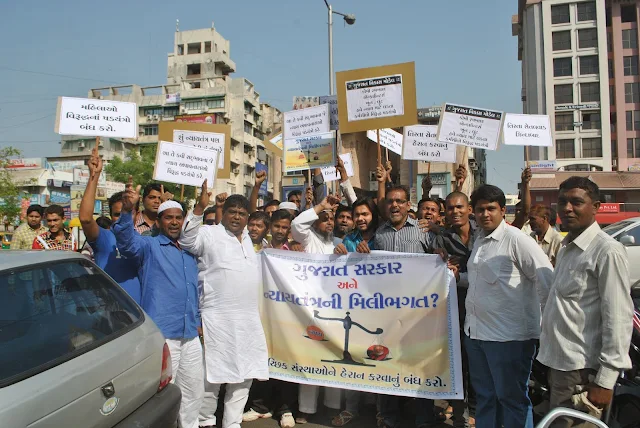Gujarat riots: Participants in Ahmedabad meet decry effort to harass human rights activist Teesta Setalvad
 |
| Protest against efforts to harass Setalvad |
By A Representative
A meeting of survivors of the 2002 Gujarat riots and citizens, organised at the Mehdi Jung Hall Paldi, Ahmedabad, by the People’s Union for Civil Liberties (PUCL), Ahmedabad, saw participants in the jam-packed hall calling for social boycott of those who are posing themselves as witnesses to the case filed against top human rights activist Teesta Setalvad in a Gujarat court for alleged misappropriation of the funds of the NGO she is heading for purposes other than fighting cases of riot victims.
Setelvad has been fighting cases of Gujarat riot victims, and is backing Zakia Jafri, wife of ex-Congress MP Ehsan Jafri, who died during the attack on Gulberg Society in Ahmedabad. Jafri seeking court permission to file an FIR against chief minister Narendra Modi for inciting rioting, in which her husband was hacked to death. At the meet, several speakers said, two former employees of Citizens for Peace and Justice (CJP), who filed cases against Setalvad, should be face "social boycott", amidst a strong approving applause from the 1,000 strong crowd.A meeting of survivors of the 2002 Gujarat riots and citizens, organised at the Mehdi Jung Hall Paldi, Ahmedabad, by the People’s Union for Civil Liberties (PUCL), Ahmedabad, saw participants in the jam-packed hall calling for social boycott of those who are posing themselves as witnesses to the case filed against top human rights activist Teesta Setalvad in a Gujarat court for alleged misappropriation of the funds of the NGO she is heading for purposes other than fighting cases of riot victims.
 |
| Sairabehn Sandhani addressing the meet |
Among those who spoke included former BJP chief minister Sureshbhai Mehta, who called for caution instead of getting swayed by emotion in the fight for communal peace, former DGP RB Sreekumar, Jesuit human rights activist Cedric Prakash, social activist Sofia Khan, and a survivor of the Gulberg massacre, Sairabehn Sandhi. Sandhi, who had lost several of her relatives in the Gulberg Society massacre, said there was "no truth" in the allegations against Setelvad, levelled by the ex-employees, who were allegedly "bribed" to go against the top activist.
In a statement from Mumbai, Setelvad said, “The cost of the
struggle for dignity, justice and reparation, personal and material, is high.
Twelve years down our success rate is 117 life imprisonments in major 2002 carnage
cases, monitored by the Supreme Court where witness protection is still being given.”
She underlined, “In all cases (except the Bilqees Bano
case in which 12 were convicted) CJP's team has been directly involved working
with survivor eye witnesses, getting threatened and maligned. To top it all is
the Zakia Jafri vs Narendra Modi and Others case, now pending hearing in
appeal in the Gujarat High Court.”
Setelvad recently got anticipatory bail from the Gujarat high court against her arrest in the misappropriation case.


Comments